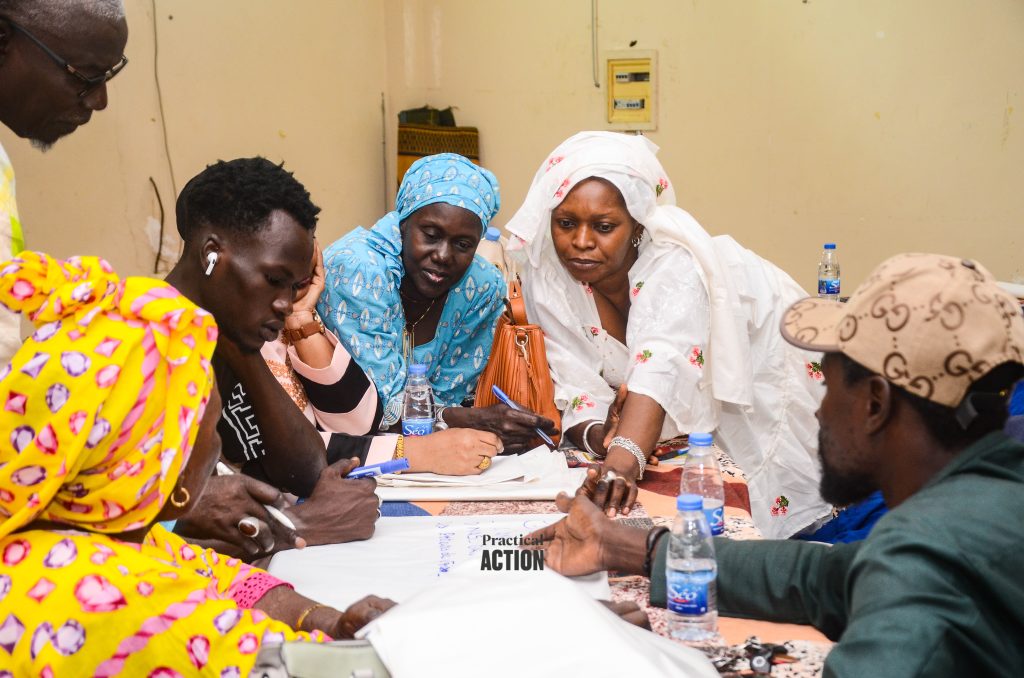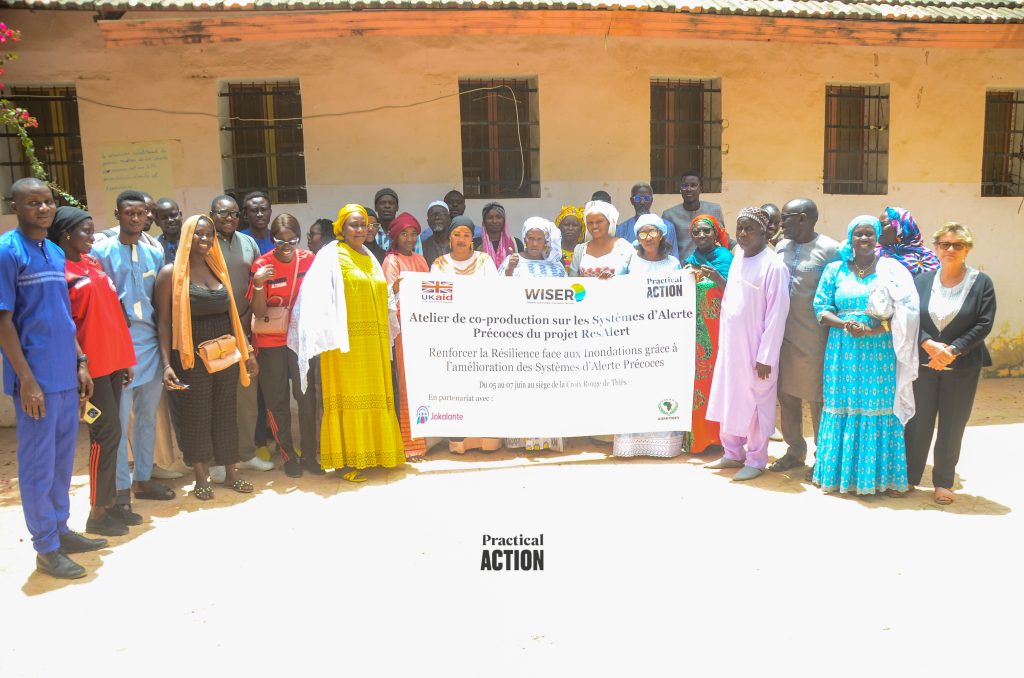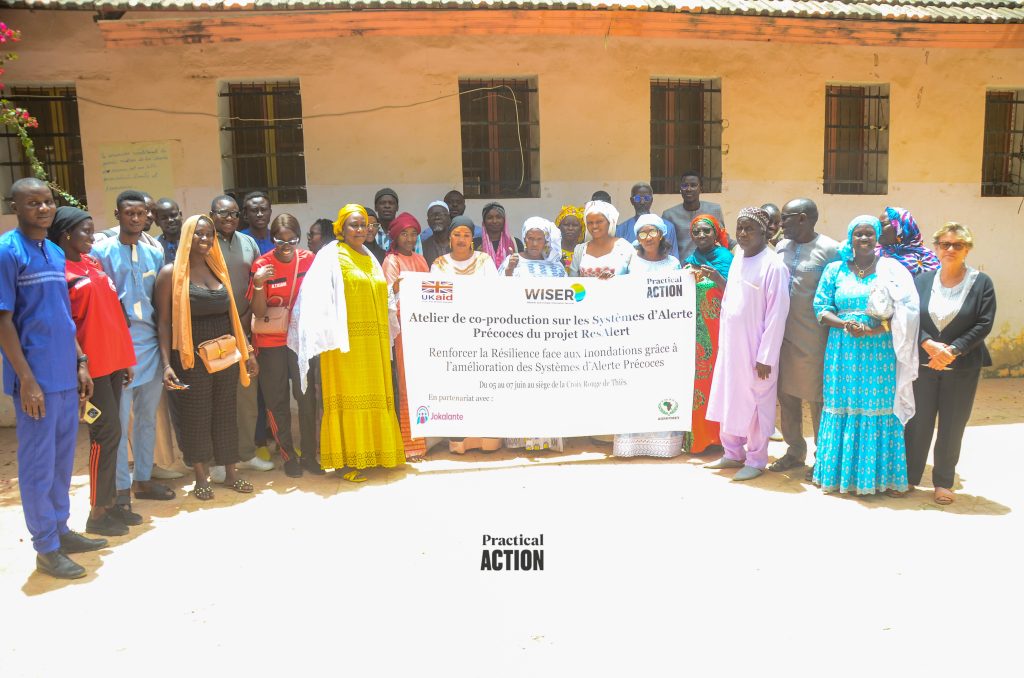Version en français ci-dessous.
In the fight against the devastating effects of the floods in Thiès, a recent initiative has taken root to strengthen the preparedness and resilience of local communities. From 5 to 7 June 2024, Practical Action West Africa, in partnership with Jokalanté, organised a major workshop in Thiès, aimed at co-producing essential climate information on flood risks.
Why is Co-Production of Climate Information Crucial?
Flooding is a constant threat to many regions across Senegal, and Thiès is unfortunately no exception. With a vulnerable population and infrastructure often ill-prepared to deal with climate change, it becomes imperative to develop effective and adapted early warning systems.
The co-production workshop brought together various key stakeholders: representatives of local authorities, technical experts, and members of affected communities. Together, they explored how to improve the understanding and use of early warning systems already in place, while developing innovative strategies to communicate climate information in a more accessible and effective way.

Workshop Highlights
The event kicked off with an inaugural session where Practical Action presented the RESALERT project “Building Resilience to Floods through Improved Early Warning Systems (EWS)” and its ambitious goals to build resilience to floods. The National Agency for Civil Aviation and Meteorology (ANACIM) then shared its seasonal weather forecasts, providing an essential basis for the discussions to follow.
Participants were then divided into working groups to explore various aspects of early warning systems, including the dissemination of climate information and concrete actions to be taken in the event of an early warning. These sessions allowed for the co-production of detailed guidelines to improve future alert messages, thus responding to the specific needs of local communities.
Impacts and Perspectives
At the end of the workshop, key recommendations were shared in brainstorming sessions with all stakeholders involved. These recommendations aim to enrich and expand the Early Warning System (EWS) in the communities of Thiès North and East, directly reaching nearly 30,000 people during the upcoming rainy season.

In short, the co-production of climate information represents a crucial step towards better flood preparedness and resilience in Thiès. It illustrates how close collaboration between organizations, local governments, and communities can turn climate challenges into opportunities for community building and sustainable protection.
Co-Production d’Informations Climatiques : Ensemble pour une Résilience Accrue
Dans la lutte contre les effets dévastateurs des inondations à Thiès, une initiative récente a pris racine pour renforcer la préparation et la résilience des communautés locales. Du 5 au 7 juin 2024, Practical Action West Africa, en partenariat avec Jokalanté, a organisé un atelier majeur à Thiès, visant à co-produire des informations climatiques essentielles sur les risques d’inondation.
Pourquoi la Co-Production d’Informations Climatiques est-elle Cruciale ?
Les inondations représentent une menace constante pour de nombreuses régions à travers le Sénégal, et Thiès ne fait malheureusement pas exception. Avec une population vulnérable et des infrastructures souvent mal préparées à affronter les changements climatiques, il devient impératif de développer des systèmes d’alerte précoce efficaces et adaptés.
L’atelier de co-production a rassemblé divers acteurs clés : représentants des autorités locales, experts techniques, et membres des communautés affectées. Ensemble, ils ont exploré comment améliorer la compréhension et l’utilisation des systèmes d’alerte précoce déjà en place, tout en développant des stratégies innovantes pour communiquer les informations climatiques de manière plus accessible et efficace.

Les Moments Forts de l’Atelier
L’événement a débuté avec une session inaugurale où Practical Action a présenté le projet RESALERT« Renforcer la Résilience face aux Inondations grâce à l’Amélioration des Systèmes d’Alerte Précoces (SAP) » et ses objectifs ambitieux pour renforcer la résilience face aux inondations. L’Agence Nationale de l’Aviation Civile et de la Météorologie (ANACIM) a ensuite partagé ses prévisions météorologiques saisonnières, fournissant une base essentielle pour les discussions à suivre.
Les participants ont ensuite été répartis en groupes de travail pour explorer divers aspects des systèmes d’alerte précoce, y compris la diffusion des informations climatiques et les mesures concrètes à prendre en cas d’alerte. Ces sessions ont permis de co-produire des lignes directrices détaillées pour améliorer les futurs messages d’alerte, répondant ainsi aux besoins spécifiques des communautés locales.
Impacts et Perspectives
À la fin de l’atelier, les recommandations clés ont été partagées lors de séances de réflexion avec toutes les parties prenantes impliquées. Ces recommandations visent à enrichir et à étendre le Système d’Alerte Précoce (SAP) dans les communautés de Thiès Nord et Est, touchant directement près de 30,000 personnes pendant la prochaine saison des pluies.

En somme, la co-production d’informations climatiques représente un pas crucial vers une meilleure préparation et résilience aux inondations à Thiès. Elle illustre comment une collaboration étroite entre organisations, gouvernements locaux et communautés peut transformer les défis climatiques en opportunités de renforcement communautaire et de protection durable.

Comments